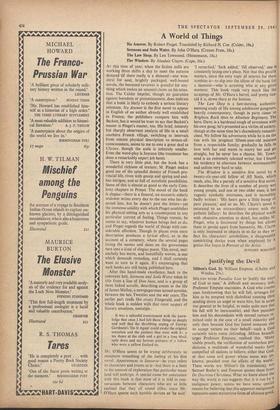A World of Things
The Law Shop. By Leo Townsend. (Heinemann, 18s.) The Window. By Alasdair Clayre. (Cape, 16s.)
AT this time of year, when the fiction mills are working three shifts a day to meet the autumn demand (if there really is a demand—one won- ders) for neat, brightly packaged, well-bound novels, the bemused reviewer is grateful for any- thing which makes an unusual claim on his atten- tion. The Calder imprint, though no guarantee against boredom or pretentiousness, does indicate that a book is likely to embody a serious literary intention. No Answer is the ,first novel to appear in English of an author already well established in France; the publishers compare him with Beckett, but it would be truer to say that Beckett's master is Pinget's master, too. His brief, leisurely but sharply observant analysis of life in a small southern French village, switching at intervals from minute physical description to stream-of- consciousness, seems to me to owe a great deal to Ulysses, though the scale is infinitely smaller. Even the word-play is Joycean (the translator has done a remarkably expert job here).
There is very little plot, but the book has a wonderful richness of texture; M. Pinget makes good use of the splendid density of French pro- vincial life, riven with gossip and spying and end- less intrigue, and so full of novelistic possibilities. Some of this is almost as good as the early Corn- bray chapters in Proust. The mood of the book is elegiac—there is a funeral, an eccentric elderly widower writes every day to the son who has de- serted him, but he doesn't post the letters—yet the immense solidity with which Pinget establishes his physical setting acts as a counterpoint to any particular current of feeling. Things remain, he seems to say, whatever human beings feel or do, and Pinget regards the world of things with con- siderable affection. Though in places even mere description produces a lyrical effect, as in the account of a cemetery, where the several pages listing the names and dates on the gravestones turn into a kind of elegiac poem. This novel, mel- ancholy but warm, and beautifully woven, is one which demands rereading, and I shall certainly want to turn to it again. It's encouraging that such books are still being published here.
After this hand-made excellence, back to the conveyor belt. Sermons and Soda Water takes its title from a line of Don Juan, and is a group of three linked novelle, describing events in the life of James Malloy, a newspaperman turned novelist, between the late Twenties and the war years. The earlier part reads like ersatz Fitzgerald, and the whole book is sodden with that most suspect of literary emotions, nostalgia : It was a splendid contentment with the know- ledge that once I had felt those things so deeply and well that the throbbing urging of George Gershwin's 'Do It Again' could evoke the original sensation and the pictures that went with it : a tea dance at the club and a girl in a long black satin dress aild my furious jealousy of a fellow who wore a yellow foulard tic.
Mr. O'Hara seems to be trying deliberately to recapture something of the feeling of his first novel, Appointment in Samarra—he even refers to characters and events in it—but there is a limit to the amount of exploration that particular waste land will undergo. A special cause for annoyance with this book is that most of it is told in con- versations between characters who are so little realised that they all sound alike; since Mr. O'Hara spurns such humble devices as 'he said,'
'I remarked,' Jack added,' Jill observed,' one constantly losing one's place. Not that this greatl matters, since the only topic of interest for these zombies is—to slip into the idiom of the book f( a moment—who is screwing who at any given moment. This book reads very much like th scrapings of Mr. O'Hara's barrel, and pretty rar cid it is, down there at the bottom.
The Law Shop is a fast-moving, authentic seeming study of life among adolescent gangster heavily contemporary, though in parts closer to Brighton Rock than to Absolute Beginners. The hero, Dave, is a hardened tough of seventeen with his own gang; he's presented as a victim of societj, though at the same time he's shamelessly romanfl' cised. We follow his adventures while he is on the run with his pregnant fifteen-year-old mistress from a respectable family; gradually he falls in love with her and wants to marry her and go straight, but he never has a chance. Mr. Towfl. send is an extremely talented writer, but 1 found his tendency to alternate between sentimentalitY and sadism very hard to take.
The Window is a sensitive first novel by twenty-six-year-old fellow of All Souls, which reads, alas, like a parody of a sensitive first novel. It describes the lives of a number of pretty wa young people, and one or two older ones; it has vaguely symbolic overtones, and is incredibly badly written : 'His heart gave a little bump is! pure pleasure,' and so on. Mr. Clayre's novel is saturated to an extraordinary extent with the pathetic fallacy: he describes the physical world with obsessive attention to detail, but unlike M. Pinget, who is fascinated by things but allows them to persist apart from humanity, Mr. ClaYre is only interested in objects in so far as they re- flect his characters' sensibilities, a disagrecablY constricting device even when employed by 3 genius like Joyce in Portrait of the Artist.' BERNARD BERGON2






































 Previous page
Previous page